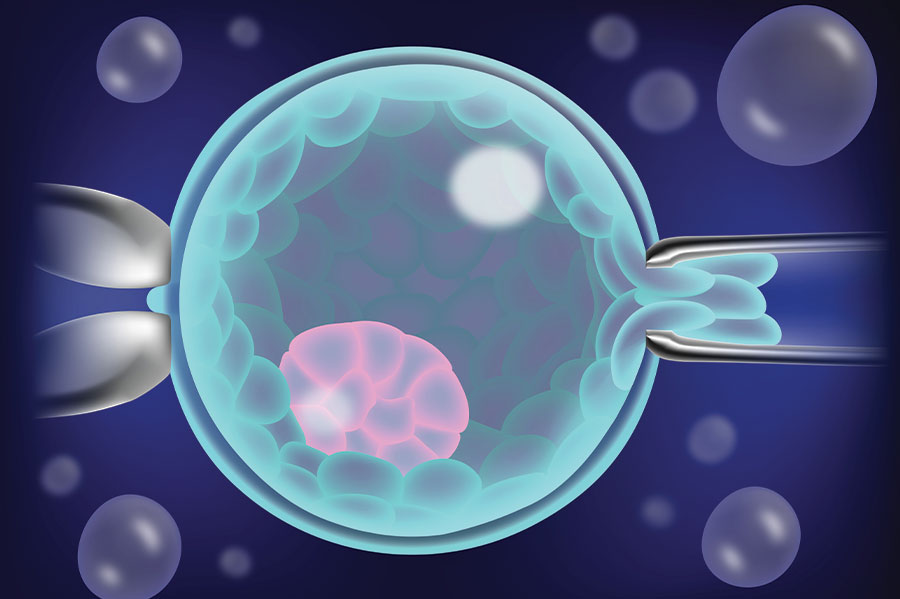PGT/PGS (Preimplantation Genetic Testing)
Advanced genetic screening for embryos to identify abnormalities and increase IVF success.
What is PGT/PGS?
Preimplantation Genetic Testing (PGT) is a crucial genetic screening process performed during an IVF cycle. It involves taking a small sample of cells from the embryo to test for genetic or chromosomal abnormalities. This allows us to identify and select the healthiest embryos for transfer, significantly increasing the chances of a successful pregnancy and reducing the risk of miscarriage or a child being born with a genetic disorder. PGT is particularly vital for couples with a history of recurrent miscarriages, failed IVF cycles, or known genetic conditions.

The PGT/PGS Process: A Step-by-Step Guide
Our meticulous process is designed to ensure the highest level of accuracy and care for your embryos.
1. IVF & Embryo Creation
The process begins with a standard IVF cycle where eggs are retrieved and fertilized in our lab to create embryos. The embryos are then cultured for several days until they reach the blastocyst stage.
2. Embryo Biopsy
Our expert embryologists perform a highly skilled biopsy, carefully removing a few cells from the outer layer of the embryo. This procedure is delicate and non-invasive to the embryo's core.
3. Genetic Analysis & Transfer
The cell samples are sent for genetic analysis. Based on the results, we select the healthiest embryos that are free from genetic abnormalities to be transferred into the uterus.
Types of PGT: Screening for Your Needs
PGT is not a single test but a family of tests designed to address different genetic concerns. We offer a comprehensive range of options to suit your specific needs.
PGT-A (Aneuploidy)
This is the most common form of PGT. It screens for chromosomal abnormalities, such as an extra or missing chromosome. Transferring a chromosomally normal embryo (euploid embryo) significantly increases the chance of a successful pregnancy and live birth, while reducing the risk of miscarriage.
PGT-M (Monogenic)
This test is for patients with a known risk of passing a specific single-gene disorder to their child, such as cystic fibrosis, sickle cell anemia, or Huntington's disease. PGT-M identifies embryos that are free from these specific genetic defects.
PGT-SR (Structural Rearrangements)
This test is for patients who are carriers of a chromosomal structural rearrangement, such as a translocation or inversion. PGT-SR helps to select embryos with a normal chromosomal makeup, preventing implantation failure or recurrent miscarriages.
Key Benefits of PGT/PGS
Reduces Miscarriage Risk
By identifying and transferring only chromosomally normal embryos, PGT can drastically reduce the risk of miscarriage, which is often caused by chromosomal abnormalities.
Increases Live Birth Rates
The selection of genetically healthy embryos leads to a higher chance of a successful pregnancy and, ultimately, a healthy live birth. This can also reduce the number of IVF cycles needed.
Prevents Genetic Disorders
For couples with a history of specific genetic diseases, PGT-M offers a way to prevent the transmission of these conditions to their children, providing peace of mind.
Success Rates & Other Key Considerations
Success Rates & Effectiveness
PGT can significantly improve the chances of a successful IVF cycle, with some studies showing a live birth rate of over 60% per embryo transfer for women over 35 when a euploid embryo is used. The effectiveness of PGT is influenced by factors like maternal age, embryo quality, and the specific genetic conditions being screened for.
At Isha Women's Hospital, our advanced lab and expert embryologists ensure a meticulous process, providing you with the highest quality of care to maximize your chances of a successful outcome.
Risks & Limitations of PGT
While PGT is a very safe procedure, it is not without some considerations. The primary limitation is that it does not guarantee a pregnancy or a healthy baby, as other factors still play a role. There is also a very small risk of embryo damage during the biopsy, but this is extremely rare when performed by skilled embryologists like ours.
Furthermore, PGT is an additional cost to your IVF cycle. Our team is committed to complete transparency, and we will discuss all risks, benefits, and costs in detail during your consultation to help you make an informed decision.
Cost of PGT/PGS in Dombivli
The cost of PGT/PGS is a significant consideration for many patients. It is an additional cost to the standard IVF cycle and is influenced by several factors, including the type of testing required (PGT-A, PGT-M, or PGT-SR) and the number of embryos being tested.
While we cannot provide an exact cost without a consultation, we believe in complete transparency. Our team will provide a detailed and clear breakdown of all costs during your initial visit, helping you plan your financial journey with confidence. We are committed to making advanced fertility treatments accessible and understandable.
Meet Our Founder & Leading Specialist

Dr. Chinmay Pataki
M.D GYNEC, IVF Specialist
Dr. Chinmay Pataki, the founder of Isha Women's Hospital, is a renowned specialist in fertility, gynecologic laparoscopy, and high-risk pregnancies. His journey is marked by excellence, including being a university rank holder and a Gold Medalist in M.D. Gynecology.
He has trained at world-class institutions, including Weill Cornell Medical College in New York for male infertility and Micro-TESE for zero sperm count, and in Germany and Italy for advanced laparoscopic surgeries. With over 10,000+ IVF cycles and 15,000+ laparoscopies to his name, Dr. Pataki's expertise ensures that you are in the most capable hands. He is a true pioneer in reproductive healthcare, dedicated to helping both women and men on their path to parenthood.
Frequently Asked Questions
What is the difference between PGT and PGS?
These terms are often used interchangeably, but there's a subtle difference. PGS (Preimplantation Genetic Screening) is the older term used for checking for chromosomal abnormalities. PGT (Preimplantation Genetic Testing) is the modern, broader term, which includes PGT-A (for aneuploidy, or chromosomal errors), PGT-M (for monogenic/single-gene defects), and PGT-SR (for structural rearrangements).
Is the embryo damaged during the biopsy?
Our expert embryologists are highly skilled in this delicate procedure. The cells are carefully removed from the outer layer (trophectoderm) of the embryo, which will later become the placenta. The core of the embryo, which develops into the fetus, remains completely untouched and safe.
How does PGT improve IVF success rates?
By identifying and transferring only the healthiest embryos, PGT significantly increases the chances of a successful pregnancy, reduces the risk of miscarriage, and decreases the number of IVF cycles needed to achieve a live birth.
What is the cost of PGT?
The cost of PGT is an additional procedure to your IVF cycle and can vary based on the number of embryos being tested. We provide a transparent and detailed cost breakdown during your initial consultation.
Can PGT be performed on previously frozen embryos?
Yes, PGT can be performed on embryos that have been frozen and thawed. This is a common practice that allows for genetic screening before a frozen embryo transfer (FET) cycle.
Does PGT increase IVF success rates?
Yes, for specific patient profiles, PGT can significantly improve IVF success rates by addressing implantation issues related to a hardened zona pellucida. It is especially beneficial for women of advanced maternal age and those with a history of implantation failure.
How long does the procedure take?
The PGT procedure itself is very quick, typically taking only a few seconds per embryo in the lab. It is a seamless part of the embryo transfer process and does not add significant time to your treatment cycle.
Is PGT suitable for donor embryos?
Yes, PGT can be performed on donor embryos, particularly if they have been previously frozen and thawed. The freezing and thawing process can sometimes cause the zona pellucida to become harder, and PGT can help ensure a higher rate of implantation.
Can PGT detect all genetic diseases?
No, PGT cannot detect all genetic diseases. It is a targeted test based on the specific type of PGT being performed. For example, PGT-M is used to detect a known single-gene disorder, while PGT-A screens for general chromosomal abnormalities. It is important to have a consultation to discuss what PGT can and cannot detect for your specific situation.
Does PGT increase IVF cost significantly?
Yes, PGT is an additional procedure with its own cost, but it can be a cost-effective choice in the long run. By increasing the chances of success per embryo transfer and reducing the risk of a miscarriage, it may help you achieve a successful pregnancy in fewer cycles.
Hear From Our Happy Families
Ready to Achieve a Healthy Pregnancy?
Schedule a consultation with our experts to learn if PGT is the right procedure for you.
Book a Consultation